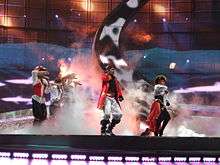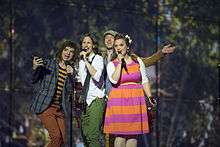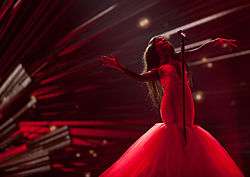Latvia in the Eurovision Song Contest
| Latvia | |
|---|---|
|
| |
| Member station | LTV |
| National selection events |
National final
|
| Appearances | |
| Appearances | 17 (10 finals) |
| First appearance | 2000 |
| Best result | 1st: 2002 |
| Worst result | Last: 2009 SF, 2010 SF, 2013 SF |
| External links | |
| LTV page | |
| Latvia's page at Eurovision.tv | |
|
Latvia in the Eurovision Song Contest 2016 | |
Latvia has participated in the Eurovision Song Contest 17 times since making its debut at the contest in 2000, where the group Brainstorm finished third with the song "My Star". Latvia won the contest in 2002, with Marie N and the song "I Wanna", defeating Malta by 12 points. Latvia is the second former Soviet country to win the contest. The 2003 contest was held in the Latvian capital Riga. The country achieved its third top 10 result in 2005, when Walters and Kazha finished fifth with "The War Is Not Over".
Latvia did not participate in the final from 2009 to 2014, when they failed to qualify from the semi-finals for six consecutive years, including finishing last on three occasions, in 2009, 2010 and 2013.[1][2] Latvia qualified for the final for the first time since 2008 at the 2015 contest with Aminata and the song "Love Injected". Her sixth place in the final is Latvia's fourth top 10 finish and best result in the contest since 2005. Latvia made its 10th appearance in the final in 2016.
Contestants
Latvia has had seventeen Eurovision entries since its debut. All of Latvia's entries have been performed in English, except for three entries: in 2004, Fomins & Kleins performed "Dziesma par laimi" for Latvia in Latvian; In 2007 when Bonaparti.lv performed Questa Notte in Italian and in 2009, Intars Busulis, having won Eirodzeisma 2009 with "Sastrēgums" in Latvian, performed the song in Russian as "Probka" (Пробка).[3]
To select the 2017 Latvian Eurovision entry, Spotify data will be included in national Eurovision vote.[4]
- Table key
| Year | Artist | Language | Title | Final | Points | Semi | Points |
|---|---|---|---|---|---|---|---|
| 2000 | Brainstorm | English | "My Star" | 3 | 136 | No semi-finals | |
| 2001 | Arnis Mednis | English | "Too Much" | 18 | 16 | ||
| 2002 | Marie N | English | "I Wanna" | 1 | 176 | ||
| 2003 | F.L.Y. | English | "Hello From Mars" | 24 | 5 | ||
| 2004 | Fomins and Kleins | Latvian | "Dziesma par laimi" | Failed to qualify | 17 | 23 | |
| 2005 | Walters and Kazha | English | "The War Is Not Over" | 5 | 153 | 10 | 85 |
| 2006 | Vocal Group Cosmos | English | "I Hear Your Heart" | 16 | 30 | Top 11 Previous Year | |
| 2007 | Bonaparti.lv | Italian | "Questa notte" | 16 | 54 | 5 | 168 |
| 2008 | Pirates of the Sea | English | "Wolves of the Sea" | 12 | 83 | 6 | 86 |
| 2009 | Intars Busulis | Russian | "Probka" (Пробка) | Failed to qualify | 19 | 7 | |
| 2010 | Aisha | English | "What For?" | 17 | 11 | ||
| 2011 | Musiqq | English | "Angel in Disguise" | 17 | 25 | ||
| 2012 | Anmary | English | "Beautiful Song" | 16 | 17 | ||
| 2013 | PeR | English | "Here We Go" | 17 | 13 | ||
| 2014 | Aarzemnieki | English1 | "Cake to Bake" | 13 | 33 | ||
| 2015 | Aminata | English | "Love Injected" | 6 | 186 | 2 | 155 |
| 2016 | Justs | English | "Heartbeat" | 15 | 132 | 8 | 132 |
| 2017 | |||||||
- NOTES:
- 1. ^ The song is in English; however, there are some phrases in Latvian.[5]
- 2. If a country had won the previous year, they did not have to compete in the semi-finals the following year. In addition from 2004-2007, the top ten countries who were not members of the big four did not have to compete in the semi-finals the following year. If, for example, Germany and France placed inside the top ten, the countries who placed 11th and 12th were advanced to the following year's grand final along with the rest of the top ten countries.
Voting history
As of 2016, Latvia's voting history is as follows:
|
| |||||||||||||||||||||||||||||||||||||||||||||||||||||||||||||||||||||||||||||||||||||
Hostings
| Year | Location | Venue | Presenters |
|---|---|---|---|
| 2003 | Riga | Skonto Hall | Marija Naumova and Renārs Kaupers |
Commentators and spokespersons
| Year(s) | Commentator | Spokesperson |
|---|---|---|
| 2000 | Kārlis Streips | Lauris Reiniks |
| 2001 | Renārs Kaupers | |
| 2002 | Ēriks Niedra | |
| 2003 | Ģirts Līcis | |
| 2004 | Lauris Reiniks | |
| 2005 | Marie N | |
| 2006 | Mārtiņš Freimanis | |
| 2007 | Janis Šipkevics | |
| 2008 | Kristīne Virsnīte | |
| 2009 | Roberto Meloni | |
| 2010 | Kārlis Būmeisters | |
| 2011 | Valters Frīdenbergs and Kārlis Būmeisters | Aisha |
| 2012 | Valters Frīdenbergs | |
| 2013 | Anmary | |
| 2014 | Ralfs Eilands | |
| 2015 | Valters Frīdenbergs and Toms Grēviņš | Markus Riva |
| 2016 | Toms Grēviņš | |
| 2017 | TBA | TBA |
Photogallery
-

Pirates of the Sea performing "Wolves of the Sea" at Belgrade (2008)
-
.jpg)
PeR performing "Here We Go" at Malmö (2013)
-

Aarzemnieki performing "Cake to Bake" at Copenhagen (2014)
-

Aminata performing "Love Injected" at Vienna (2015)
References
- ↑ "Eurovision Song Contest 2009 Semi-Final (2)". Eurovision.tv. Retrieved 22 May 2014.
- ↑ "Eurovision Song Contest Semi-Final 2013 (2)". Eurovision.tv. Retrieved 22 May 2014.
- ↑ Floras, Stella (2009-03-01). "Latvia: Sastregums to be performed in Russian". ESCToday. Retrieved 2009-03-01.
- ↑ "Latvia to include Spotify data in national Eurovision vote". eng.lsm.lv. 24 October 2016. Retrieved 12 November 2016.
- ↑ Eurovision.tv. "Cake to bake, original lyrics". eurovision.tv. European Broadcasting Union. Retrieved 24 June 2014.
External links
- Points to and from Latvia eurovisioncovers.co.uk

